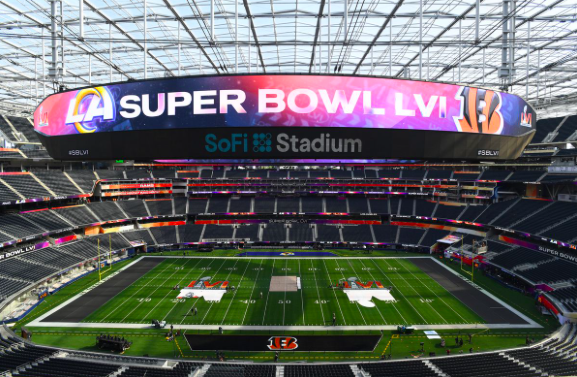Under the blistering Inglewood sun, dozens of street vendors made their way to SoFi Stadium on February 13th with hopes of earning a few extra dollars during the highly anticipated Super Bowl of the decade. It’s been 15 years since Los Angeles hosted the huge event and there was an even greater buzz in our city as the LA Rams made it to the final showdown for the Vince Lombardi Trophy. Behind all the celebration and excitement, a darker and worrisome story unfolded.
On February 3rd, days prior to the major event, local advocacy groups and law enforcement warned about the dangers of human trafficking that could incite as a result of the big game. According to local organizations, the greater influx of visitors and revenue during Super Bowl festivities has historically created an alarming spike in sex trafficking, including the trafficking of children. With this pretext, federal authorities deemed it necessary to increase law enforcement presence around SoFi Stadium. This presence included Homeland Security (HSI), in the form of Immigration and Customs Enforcement (ICE). The panorama quickly shifted, and street vendors became the primary targets of the pursuit.
HSI Secretary Alejandro Mayorkas explained that ICE agents would be present during the Superbowl, to “make sure that people enjoy [the event], but [that] they also ensure the integrity of the marketplace; we [must] combat the trafficking in stolen and counterfeit merchandise. It is a multi-million dollar under-the-table industry that we’re very focused on cracking down on.” Mayorkas’ statement begs the question: Why is this suddenly such a critical issue when “under-the-table” merchandise sales take place regularly at concerts and events?
As my colleagues and I roamed the neighborhoods surrounding SoFi Stadium, we came across numerous vendors who, upon receiving our “Know Your Rights” fliers, were grateful to see us supporting their work and advocating for their safety. After hours of walking the perimeter and distributing information about how to confront encounters with ICE, it was comforting to learn that very few incidents took place around the criminalization of street vending, with the exception of some merchandise confiscation and vendor relocation due to safety concerns.
In reflecting on the day’s event, however, I couldn’t help but wonder about the future of Los Angeles. We’ll be experiencing increases in the cost of living, displacement, and law enforcement presence, as the city prepares for two other major international events: the 2026 World Cup and the 2028 Olympics. How will this affect our communities and the overall safety of our immigrant and most vulnerable populations?
The Super Bowl was, in many ways, an experiment for what to expect in the next ten years as city officials prepare for these major international attractions. What was especially disconcerting about law enforcement during the Super Bowl was the fact that HSI worked hand-in-hand with the Los Angeles Sheriff’s Department. My colleagues and I were stunned to see ICE agents riding with Sheriff officers, patrolling the area together, and causing distress to the few vendors that took a chance that day because they need to make a living.
With the rising cost of housing and other basic resources, it only makes sense to see an increase in street vending throughout the region. In fact, many local families that live around the stadium sold parking spots near their homes (for hundreds of dollars]), food, and other goodies, in an effort to make an extra buck in a city afflicted by gentrification and the rising cost of living. A 2018 mapping by the Urban Displacement Project found that Los Angeles County exhibited the highest rates of gentrification in the state, with 10% of tracts classified as at-risk of gentrification, early/ ongoing gentrification, or advanced gentrification.
Furthermore, according to the Consumer Price Index Report, the cost of core goods has risen 7.5 percent. In Los Angeles, food prices are 7.3 percent higher. Energy prices are up 33 percent. The index for all items, excluding food and energy, is 5.5 percent higher. It is unsettling to see how a city historically perceived as a place of hopes, dreams, and opportunity continues to experience a widening gap between rich and poor.
Even more disheartening is watching local officials sell our city to the highest bidders in the name of redevelopment and big money, which is quickly displacing low-income families, including street vendors. Street vendors represent some of the city’s most vulnerable populations, nonetheless, they are continually criminalized for their work, despite the fact that in 2018, the State of California and the City of Los Angeles passed legislation to legalize street vending. Yet, three years later, “most sidewalk food vendors remain exposed to the daily threat of ticketing, harassment, and fines, which perpetuates a never-ending cycle of criminalization and poverty.”
Days ago, two street vendors were run over in their place of work; one died and the other is in critical condition. How is it that, instead of creating safer conditions for these individuals, the city/ county continues to embrace unjust and discriminatory practices that puts them in even greater harm’s way? How is this homeland security? Security for whom and for what purposes? What is the point of having multi-million dollar events when we are marginalizing those that work tirelessly to make this city a worldwide marvel? Hardly feels like homeland security.

